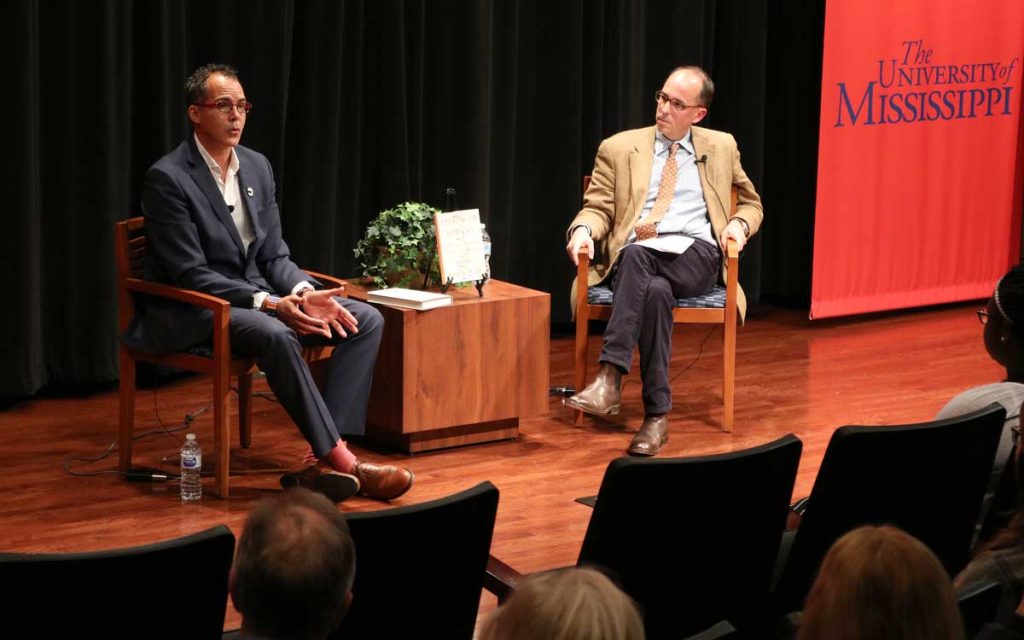One in 3 black men in the United States is under criminal justice supervision, and while the country makes up 5 percent of the world’s population, it has 25 percent of the world’s prisoners, according to James Forman Jr. He said this is the new crisis the country has on its hands.
“We have to be doing something wrong to produce those numbers,” Forman said.
Forman, a Yale Law professor and former D.C. public defender, visited the Overby Center Auditorium on Tuesday night to discuss how controlling crime and drug use with harsh sentencing has been counterproductive among people of color in America and to promote his book “Locking Up Our Own: Crime and Punishment in Black America.”
The book delves into the topic of mass incarceration in the United States and how it is negatively affecting the African-American community disproportionately.
He said that while incredible progress has been made in combatting racism, there are still many issues that aren’t being addressed.

James Forman Jr., a Yale Law School professor and author of “Looking Up Our Own”, discusses with Tucker Carrington the effects of the American criminal justice system on African Americans. Photo by Logan Conner
“I wouldn’t trade with any previous generation of African-Americans. I would not trade living through the Jim Crow segregation, and I would certainly not trade a time earlier than that,” Forman said.
He said mass incarceration is the newest human rights and racial justice crisis.
“The dilemma that I face in this moment is simultaneous, overwhelming, undeniable progress and great human tragedy, suffering and racial injustice,” he said.
An idea Forman addressed in his book was how the African-American community can be both underpoliced and overpunished.
“For most of American history and still in many ways to this day … but especially before the Civil Rights Era, one of the basic stories of the African-American relationship to the criminal justice system was under protection,” Forman said. “Crimes against black people did not get investigated and did not get pursued.”
Forman said past white-on-black violence proves underpolicing to be true.
“We know this in the famous case of Emmett Till (and) the cases of Schwerner, Goodman and Cheney, the cases of civil rights workers killed and when they went to look for their bodies, right here in this state, they found other bodies on river banks of black people, the crimes of whom had never even been investigated,” Forman said.
He said the lack of protection is a central part of American history.
“At the same time, we have this history of overpunishment, and that’s a thing that, in a lot of ways, we’re living with today,” he said.
Forman said he decided to write “Locking Up Our Own” when he grew frustrated with the lack of African-American perspective in the world around him, like the lack of black actors in television and movies. He said when he was seeing African-American perspectives, they were limited to people who were incarcerated or victims of extreme violence but not showing African-American decision-makers, intellectuals and politicians.
“I feel like that’s a part of the story that needs to be told,” Forman said.
Beginning in the 1970s, the United States saw an 800 percent increase in African-American elected officials.
“We are policed. We are imprisoned. We are arrested. We are victims of crime,” Forman said. “We’re all of those things, but we’re not only that. We’re also intellectuals and activists and citizens and elected officials.”
Tucker Carrington, assistant director of law at the Ole Miss law school, said he decided to ask Forman to speak at the university because he believes his book offers insight on an issue affecting both the nation and the state of Mississippi.
“Mr. Forman is really a national voice on one of the most critical social issues facing us, particularly in Mississippi,” Carrington said. “It’s a fantastic book. It’s both beautifully written and also deeply researched. I’ve read it twice, and it is absolutely terrific.”
Author and journalist Ralph Eubanks, who serves as a visiting professor of Southern studies, said he attended the event because of his interest in the book and how the topic pertains to Mississippi.
“I came tonight because it’s a real interest of mine. I’m a D.C. resident, and I think that this is a really important issue,” Eubanks said. “I think, in particular, the example Forman gave from this community, an African-American man being stopped twice by police officers within a single morning, that it is a problem. We have far too many people incarcerated in the state.”
Julia Grant, a sophomore public policy leadership major from Gulfport, said she attended the night’s discussion because mass incarceration interests her.
“Over the summer, I was answering calls at the Supreme Court from very poor petitioners that really didn’t see a lot of hope for their future,” Grant said. “I just kind of got interested in criminal justice reform and particularly the war on drugs that asymmetrically penalizes young black men.”
Grant said Forman did a great job of explaining why his book is important to read and how it contributes to literature already written on the topic.






